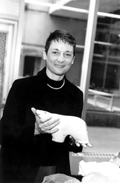Wendy
Orr

Dr Wendy Orr qualified as a medical doctor at the University of Cape Town, South Africa in 1983. In 1985, while working in the medical examiner's office in Port Elizabeth she became the first and only doctor in government employment to reveal police torture and abuse of political detainees, when she applied to the Supreme Court, detailing a pattern of extensive torture and abuse of detainees, for a restraining order against the police. In a widely publicised outcome, she successfully obtained a court order to protect detainees from police assault.
After leaving Port Elizabeth, she worked in a number of health care settings,
including the private sector, non-profit sector and tertiary education.
She remained deeply involved in human rights activist work,
particularly as it pertained to health care, engaging in activities which
included volunteer work for the National Medical and Dental Association's
Detainee Service, volunteer work for Rape Crisis and People Opposing Women's
Abuse and membership of the Human Rights Committee's Working Group on
the provision of health care in prisons. She was awarded Civil Rights
League Human Rights Award in 1990 and in 1991 was shortlisted for the
American
Association for the Advancement of Science's Human Rights Medicine
Fellowship.
In the early 19901s she became involved in activism around HIV/AIDS and spearheaded the University of Cape Town1s HIV/AIDS policy development and implementation processes. She trained as an AIDS counsellor in London and New York and played an active role in AIDS education and training on the campus of UCT.
In 1995 she was appointed by then President Mandela as a Commissioner on the Truth and Reconciliation Commission of South Africa. She served on the TRC until its closure in 1998. She was responsible for organising the TRC hearing into the role of health professionals in human rights abuses, and assisted with the investigation into the military doctors who participated in South Africa's Chemical and Biological Warfare programme. In June 1997, she received the MK Seedat Health and Human Rights Award and in December 1998 received the United Nations Association Human Rights Community British Medical Association on a report on the role of doctors in preventing human rights abuses, between1996 and 2000.
After the closure of the TRC, she was appointed as Director of Transformation and Employment Equity at the University of the Witwatersrand, Johannesburg. She continued her involvement in the health sector, however. She was a member of the Medical Research Council's Ethics Committee for five years from 1999 to 2004; in 2000 she was appointed Visiting Fellow at Tuskeegee Bioethics Institute, Alabama and she also chaired a sub-committee on prison health as part of the Dual Loyalties Working Group - an international coalition of doctors and lawyers, which has developed new codes of conduct for medical doctors in ethically complex working environments eg prisons, security forces, police forensics etc.
She resigned from the University of the Witwatersrand in October 2005 and is now consulting to the private and higher education sectors on transformation and black economic empowerment strategies.
She is single and has a six year old son who is the most precious thing in her life.